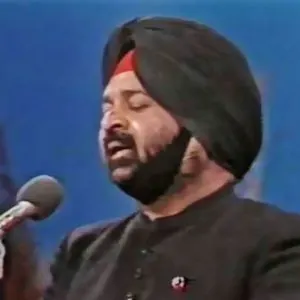Biography
Asa Singh Mastana was born into a modest Sikh family in Lahore, where the spirit of Punjabi folk music was deeply rooted in everyday life. From a young age, he displayed a natural flair for music and was influenced by traditional Punjabi instruments and the folk narratives that echoed across rural Punjab.
After the partition in 1947, Asa Singh migrated to India and settled in Amritsar, where he began performing at local cultural events. Despite facing initial hardships and displacement, his deep voice, mastery of Punjabi dialects, and command over folk storytelling soon caught the attention of audiences and radio programmers alike.
His big break came when All India Radio (AIR) began airing his songs regularly, making his voice a staple in Punjabi households. His popularity soared with renditions of folk epics such as Heer-Ranjha, Mirza-Sahiban, and devotional songs that captured the essence of Punjab.
Career
Asa Singh Mastana’s career is a cornerstone of Punjabi music history. With his signature deep and soulful voice, he revived and preserved countless traditional Punjabi folk songs. His performances weren’t just songs—they were storytelling experiences that celebrated Punjabi culture, love, tragedy, and valor.
He recorded numerous albums and toured extensively across India and abroad, bringing Punjabi folklore to audiences in the UK, Canada, and the US. His work with Doordarshan and All India Radio helped popularize folk ballads across regions and generations.
Some of his most cherished songs include:
- “Jugni”
- “Heer Waris Shah”
- “Mirza Sahiban”
- “Balle Ni Panjaaban”
In recognition of his enormous contribution to Indian music, he was awarded the Padma Shri in 1985 and the Sangeet Natak Akademi Award—both prestigious honors in Indian cultural arts.
Relationships & Affairs
Asa Singh Mastana led a simple and private personal life, rarely making headlines for controversies. He was married and had children, including Lal Singh Mastana, who followed in his father’s musical footsteps and is a noted singer in the Punjabi music circuit.
The Mastana family upheld the tradition of Punjabi folk, and Asa Singh remained devoted to both his craft and his family throughout his life.
Other Facts & Life Insights
- Education & Training: While formal education details remain limited, his musical learning came primarily through traditional means—oral storytelling, folk gatherings, and self-practice.
- Legacy Through AIR: Asa Singh was one of the most featured artists on All India Radio Jalandhar, especially during the 1960s and ’70s.
- Influence on Future Artists: Many modern Punjabi singers and folk revivalists cite Asa Singh Mastana as a direct influence, including Hans Raj Hans, Gurdas Maan, and Lal Chand Yamla Jatt.
- International Fame: He performed across Europe and North America, where large Punjabi diaspora communities admired his work.
- Interesting Fact: Despite being deeply traditional, Asa Singh Mastana embraced new technologies in his time and participated in music recordings and interviews till his last years.
Conclusion: The Legacy of Asa Singh Mastan
Asa Singh Mastana’s contribution to Indian music, especially Punjabi folk, is immeasurable. He wasn’t just a singer—he was a cultural custodian, preserving the voice of Punjab’s rural soul for future generations. His songs continue to resonate, reminding people of their roots, emotions, and stories from the heartland of Punjab.
In a world of fast-changing music trends, Asa Singh Mastana remains timeless. His voice continues to inspire singers, evoke nostalgia, and keep Punjabi folklore alive.


